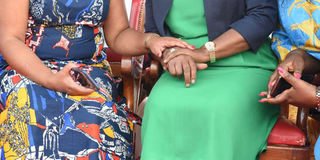BBI could help achieve the two-thirds gender rule

What you need to know:
- Parties to be compelled through the Political Parties Act to be consistent with the Constitution on the gender rule
- There is a requirement of 42 nominated MPs to achieve the gender principle
- Gender Bill is still a mirage despite three attempts to pass it in Parliament
- Proposes that the running mate of each candidate for the position of governor be of the opposite gender.
The Building Bridges Initiative (BBI) report is likely to give women in the country a lifeline on the elusive two-thirds gender rule, which has proved a hard nut to crack in the past.
The report, which was launched by President Uhuru Kenyatta and Opposition leader Raila Odinga in November last year, contains a raft of proposals aimed at guaranteeing gender equality, inclusivity and representation.
The gender rule is among the major wins for women in the document - it features prominently as among the key pillars to help attain equal representation and inclusivity across the genders.
This, the report observes, will equalise both genders politically, rather than creating a parallel system that creates a sense of tokenism.
Futile attempts
“Parties should be compelled through the Political Parties Act to be consistent with the Constitution to meet the gender rule and other Constitutional measures of inclusion through their party lists,” says the report.
The resolve to use political parties to attain the gender rule, is a change of tact from the traditional one of using Parliament, which has proved futile after attempts in the past.
This means party lists presented to Independent and Electoral and Boundaries Commission (IEBC) during elections must have 97 of 290 candidates vying for the MP seat as women, while 16 of 47 gubernatorial and senatorial candidates, must also be women.
In addition, of 1,450 candidates for the Member of County Assembly (MCAs) in the country, 483 should be women. This is excluding the nominated slots in the National Assembly, Senate and County Assemblies.
Two-thirds gender rule
As it is, the composition of both the National Assembly and the Senate falls short of the constitutional threshold.
Observers say this could go a long way to help achieve the elusive two-thirds gender rule.
Currently, the National Assembly has 75 women, 22 elected from the 290 constituencies in the last election; six nominated and 47 elected as woman representatives.
There is, therefore, a requirement of 42 nominated MPs to achieve the gender principle.
Women have been embroiled in an eight-year battle with their male counterparts to have the gender rule implemented to no avail. It will be interesting to see if political parties will respect the BBI recommendations or they will take the women round in circles as has happened with Parliament.
Gender gap
In December 2012, the Supreme Court directed the Government to implement a progressive approach in filling the gender gap by August 27, 2015.
The court directed both Houses to enforce the gender rule within 60 days. Despite the directive, the order was not implemented.
Meanwhile, almost nine years after promulgation of the Constitution, the Gender Bill is still a mirage despite three attempts to pass it in Parliament.
The BBI report seems to reassure women that all is not lost as it wants them to rightfully take their place in leadership at all levels.
“Complying with the two-thirds gender rule is key in ensuring women are visible in leadership, and will establish a more level playing field when it comes to electoral competition,” the report says.
To achieve equal representation, the report has retained the existing 290 constituencies and the protected seats, which include the Woman Representative and nominated Members of County assembly (MCAs) positions.
Treated equally
However, it proposes a stricter method for filling the nominated slots.
Apart from the gender rule, women have also won big on safety and security with the report recommending that all Kenyans be treated equally on matters security. The report recognises sexual abuse and violence as a major security concern.
It recommends that security services draw up more responsive strategies especially to women, as they are more prone to sexual violence.
The report also outlines and emphasises on food, housing, security, education, health and family planning as some of the rights enshrined in the Constitution 2010 that need to be implemented.
On devolution, it proposes that the running mate of each candidate for the position of governor should be of the opposite gender.
Deputy governors
“This will equalise both genders politically, rather than creating a parallel system that creates a sense of tokenism,” the report points out.
During the 2017 election, only a handful of governors appointed deputies from the opposite gender.
They include Governors Salim Mvurya (Kwale), Granton Samboja (Taita Taveta), Stephen Sang (Kericho), Samuel Tunai (Narok), Paul Chepkwony (Kericho), the late Joyce Laboso (Bomet), Charity Ngilu (Kitui), Kivutha Kibwana (Makueni), Stephen Sang (Nandi), Francis Kimemia (Nyandarua) and Ann Waiguru (Kirinyaga).
The current Constitution states that “each candidate for election as county governor shall nominate a person who is qualified for nomination for election as county governor as a candidate for deputy governor.”
Priscilla Nyokabi a commissioner at National Gender and Equality Commission says women are happy with BBI and want its implementation immediately.
“Women have a reason to celebrate BBI in all levels. We are going to support, protect and pursue its implementation.
“On devolution, women have won and now seek to have either the deputy president position or that of prime minister, once it is passed,” says Nyokabi.
She says women will push to have political parties’ lists contain names of women in some of their strongholds in order to guarantee them of a win.
She adds that the report is good for women since it accommodates social and economic rights for women and children.





